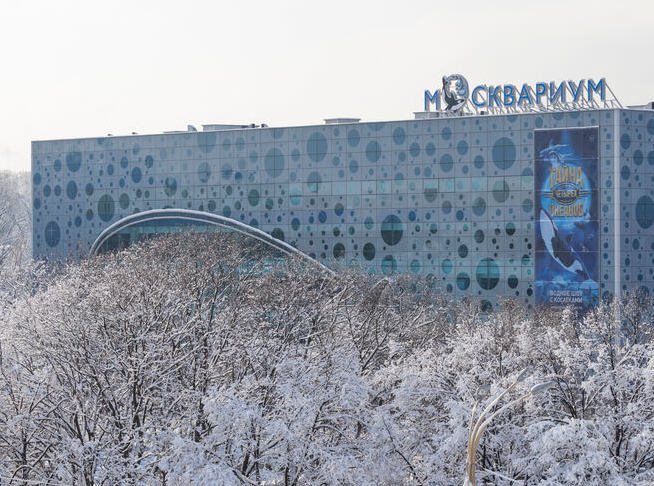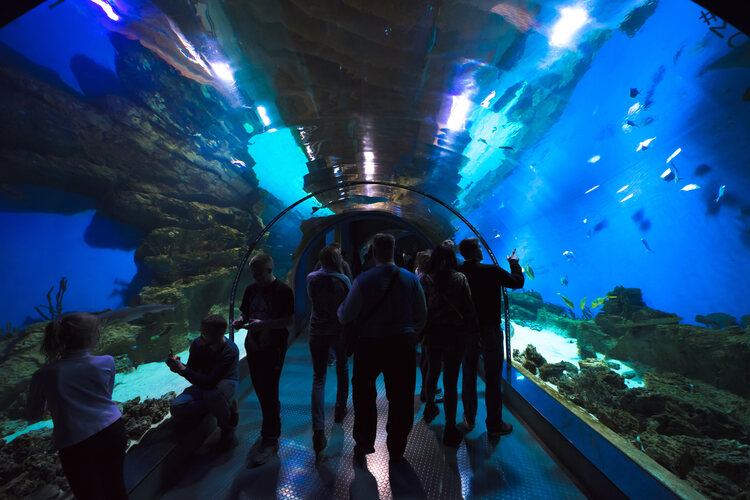
‘Nord’ orca dies only months after another young orca perishes in the same controversial Russian aquarium
By Victoria Heath
A 16-year-old orca, Nord, died at a Russian aquarium earlier last week – the second orca death at Moskvarium this year, and one of seventeen marine mammals to die at the facility since its opening in August 2015.
According to Moskvarium, Nord died due to an acute peptic ulcer of the stomach. Weighing 3,749 kilograms (8,267 lbs) and 6.9 metres long (22.9 feet), Nord was the only male orca housed at Moskvarium.
Eleven bottlenose dolphins, one beluga whale, one seal, one orca and two walruses are officially documented to have died at the Moscow-based aquarium, which houses more than 12,000 marine and freshwater inhabitants in 80 aquariums – and now another orca is added to the startling list of deaths.
The deaths of Nord and Narnia orcas
Moskvarium, the largest aquarium in Europe according to its website, has been home to three orcas since its opening in 2015 – with now only Naya, the surviving orca, left.
All orcas at the aquarium were wild captured transient orcas. These transient orcas usually hunt and feed on larger prey, such as small mammals – rather than the dead fish that they are fed at Moskvarium.
Narnia, Nord and Naya displayed worrying behaviour, such as becoming stuck on the stage or slide-out platform of their tank, acting aggressively to each other and lashing out at trainers. According to Keiko Conservation, Narnia disappeared completely at one point from Moskvarium, only reemerging after public demands to see her – allegedly, she had ingested something in her tank.
‘All the marine mammals there were kept indoors all the time. They never see the sun, which must be torture for all these wild-captured individuals,’ said orca expert Dr Ingrid Visser.
Earlier this year, 17-year-old orca Narnia died from intestinal volvulus, sparking discussions over the untimely death of a cetacean which can normally live to 80 years old in the wild.
‘Narnia was so young. It breaks my heart that her existence was limited to a concrete tank,’ said Founder of Save Dolphins movement, member of Free Russian Whales coalition and Dolphin Project volunteer, Oxana Fedorova.
‘The solution is a sanctuary for orcas and other cetaceans, and I believe this is feasible in Russia.’
Returning to the wild may be an unfeasible prospect due to the poor condition of Naya’s teeth after being in captivity, according to Visser.
History of orca capture
At least 29 orcas were taken away from their pods in Russian waters and placed into captivity between 2012 and 2018. One orca now remains in Moscow, fifteen sold to China and ten released in 2019 after being caught without governmental permission.
Narnia was captured near Reineke Island in the Sea of Okhostk on 11 August, 2012, and the following year, Nord was caught off the Sakhalin Island coast. Naya, the surviving orca, was allegedly captured in the summer of 2014 from the Sea of Okhostk.
Narnia was transported over 9,000 kilometres (5,592 miles) after her capture, and kept alone in a warehouse without fresh air and natural light. Initially, she was housed in a new dolphinarium in Moscow, but was transported to Moskvarium in 2015.
Some of the captive dolphins housed in Moskvarium were purchased from Taiji drive fisheries in Japan, notorious for their brutal hunting methods to capture and slaughter orcas.
At least 175 orcas have died in captivity across the world, and 30 orca calves have either been miscarried or stillborn. There are currently around 56 orcas held captive worldwide, with SeaWorld in North America holding more orcas than any other marine park.
Moskvarium response to Nord orca death
In a statement released by Moskvarium, it said: ‘Until the last day, Nord’s behaviour and medical indications showed no signs of illness. What happened is a huge loss for everyone.’

‘Despite the high level of competence of the centre’s experts, extensive experience in working with marine mammals, the constant development and implementation of new elements to enrich the habitat of animals, significant annual investments in veterinary equipment and the modernisation of all systems of the complex, it is extremely difficult to approximate the artificial conditions for keeping large marine mammals to natural.’
Moskvarium has confirmed its position for ‘a complete ban on the capture of marine mammals for educational and cultural purposes.’
Related links
- 57-year-old orca held captive in Florida aquarium to be released
- Study explains why Orcas are attacking boats in the Strait of Gibraltar
- Life Changing: Todd Thimios’ stunning Norway orca photography
- Orca attacks yacht off Shetland





